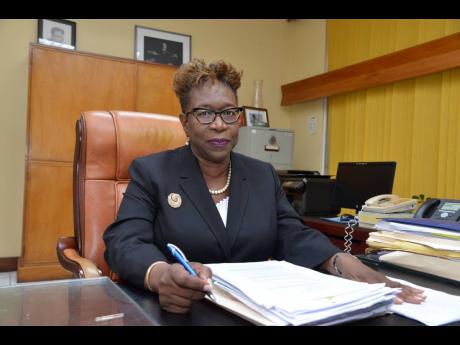DPP ‘steps aside’
Llewellyn says she is unable to carry out duties at this time; acting chief prosecutor to be appointed today
Paula Llewellyn, the long-standing director of public prosecutions (DPP), has decided to “step aside” in wake of the controversy over the various interpretations of Friday’s Constitutional Court ruling on the validity of her extended tenure.
With the court determining that her extension last year was “unconstitutional, null, and of no legal effect”, the disagreements over whether Llewellyn could return to office this week spilled over into the weekend and threatened to leave the justice system in chaos Monday morning.
Late yesterday afternoon, the Attorney General’s Chambers said that due to the ambiguity and the consequent uncertainty from the court’s ruling, the DPP had advised that “she is unable to carry out the functions of her office at this time”.
The attorney general indicated that in accordance with Section 90 (3) of the Constitution, the Public Service Commission (PSC) would be invited to appoint a qualified person to act in the role of DPP for the time being.
With no DPP in place, some judges, speaking with The Gleaner yesterday, were adamant that court matters would continue on Monday, but prosecutors were concerned about moving forward with no leader in the Office of the DPP (ODPP).
Last night, however, Justice Minister Delroy Chuck told The Gleaner that the new membership of the PSC had been appointed on Sunday, and the acting DPP would be appointed today, quelling any such concerns about a leader being in place in the ODPP.
At the same time, in its statement, the attorney general’s office said, “After careful consideration of the judgment and in the public interest, the attorney general will be appealing the Full Court’s decision immediately to have the issues resolved and determined by the Court of Appeal.”
Last Friday, the court said the change in the Constitution in July last year, to raise the age of retirement for the DPP and the auditor general from 60 to 65, was valid. However, the amendment allowing Llewellyn to choose to remain was wrong.
The court ruled that “the incumbent DPP has already reached the extended retirement age, [which] means that the application of Section 2(2) cannot lead to another extension by way of an election on the part of the incumbent DPP as this is unlawful”.
The DPP reached the age of retirement in 2020 but got a three-year-extension, which ended in September 2023.
Opposition lawmakers Phillip Paulwell and Peter Bunting challenged the amendment to the Constitution. The attorney general was the respondent in the matter.
King’s Counsel Michael Hylton, who represented Paulwell and Bunting, argued that the ruling meant that Llewellyn would have to leave office immediately.
However, other parties, including the Attorney General’s Chambers and Minister of Justice Delroy Chuck, were of different views.
On April 19, a media release from the Attorney General’s Chambers stated that the claimants had interpreted the orders of the court as having the effect of removing the incumbent DPP from office.
”No order has been issued to that effect,” the statement outlined.
Early yesterday, Opposition Leader Mark Golding castigated the attorney general and Chuck over their interpretation of the judgment and called for their immediate resignations.
Hylton also sent a letter yesterday to the law firm Livingston Alexander & Levy, with attention to King’s Counsel Allan Wood, representing the respondent, in which he pointed out that the statement from the attorney general’s office suggests that in the view of the attorney general and public statements from Chuck, the judgment did not affect Llewellyn’s status as DPP and she was still entitled to exercise the powers of that office.
“One is, of course, entitled to question whether the judgment is correct and to challenge it on appeal. However, in our respectful view, the intent and effect of the judgment are plain,” Hylton outlined in his letter. It was further pointed out by Hylton that if Llewellyn continued to exercise the powers of the office (as the initial comments by Chuck and McKoy suggested), her actions might not have been saved by Section 96 (2) of the Constitution and the country might have been plunged into a true constitutional crisis. The section makes provision for whatever rulings or prosecutions the DPP did before the judgment on Friday to be valid.
A legal expert, asked to comment on the crisis that was likely to take place in the courts if Llewellyn did not step aside, told The Gleaner that “to avoid chaos today at the courts, the Government should have instructed the PSC to hold an emergency meeting over the weekend for the governor general to appoint an acting DPP”.
Secondly, the legal expert said, the attorney general should make an application to the said court for the judges to clarify their orders if there is any confusion. This is known as the slip rule, which allows a party to the action to seek clarification.

